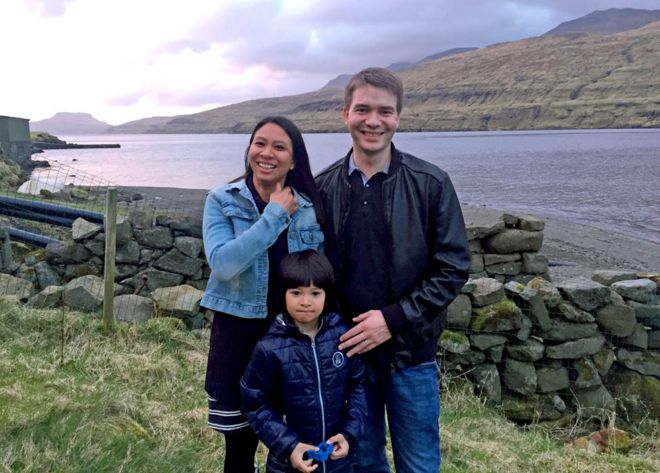
Athaya Slaetalid with husband Jan and their son Jacob
There's a shortage of women in the Faroe Islands. So local men are increasingly seeking wives from further afield - Thailand and the Philippines in particular. But what's it like for the brides who swap the tropics for this windswept archipelago? When Athaya Slaetalid first moved from Thailand to the Faroe Islands, where winter lasts six months, she would sit next to the heater all day: "People told me to go outside because the sun was shining but I just said: 'No! Leave me alone, I'm very cold.'" Moving here six years ago was tough for Athaya at first, she admits. She'd met her husband Jan when he was working with a Faroese friend who had started a business in Thailand. Jan knew in advance that bringing his wife to this very different culture, weather and landscape would be challenging.
"I had my concerns, because everything she was leaving and everything she was coming to were opposites," he admits. "But knowing Athaya, I knew she would cope."
There are now more than 300 women from Thailand and Philippines living in the Faroes. It doesn't sound like a lot, but in a population of just 50,000 people they now make up the largest ethnic minority in these 18 islands, located between Norway and Iceland. In recent years the Faroes have experienced population decline, with young people leaving, often in search of education, and not returning. Women have proved more likely to settle abroad. As a result, according to Prime Minister Axel Johannesen, the Faroes have a "gender deficit" with approximately 2,000 fewer women than men.
This, in turn, has lead Faroese men to look beyond the islands for romance. Many, though not all, of the Asian women met their husbands online, some through commercial dating websites. Others have made connections through social media networks or existing Asian-Faroese couples. For the new arrivals, the culture shock can be dramatic.
Officially part of the Kingdom of Denmark, the Faroes have their own language (derived from Old Norse) and a very distinctive culture - especially when it comes to food. Fermented mutton, dried cod and occasional whale meat and blubber are typical of the strong flavours here, with none of the traditional herbs and spices of Asian cooking.
And, although it never gets as cold as neighbouring Iceland, the wet, cool climate is a challenge for many people. A good summer's day would see the temperature reach 16°C.
Athaya is a confident woman with a ready smile who now works in the restaurant business in Torshavn, the Faroese capital. She and Jan share a cosy cottage on the banks of a fjord surrounded by dramatic mountains. But she's honest about how difficult swapping countries was at first. "When our son Jacob was a baby, I was at home all day with no-one to talk to," she says.
http://www.bbc.com/news/magazine-39703486
|